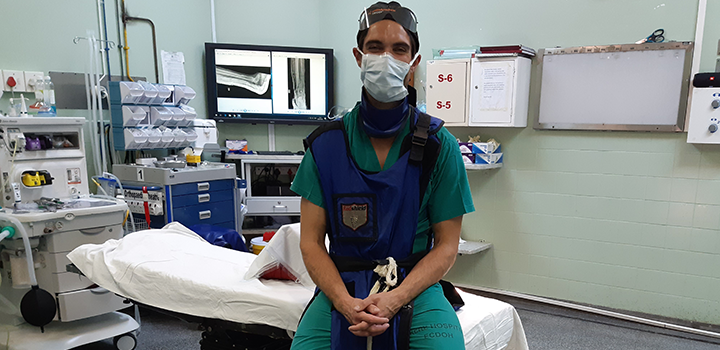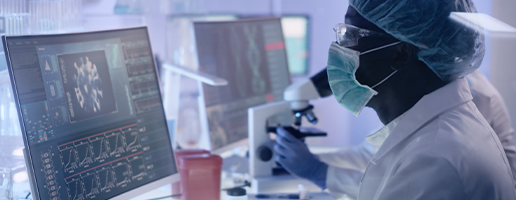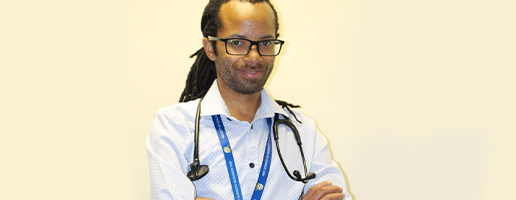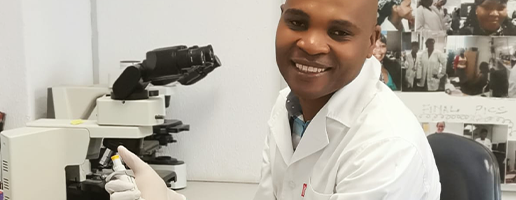How a love of Lego led Dr Kaylem Coetzee to orthopaedic surgery

Dr Kaylem Coetzee's parents could never have guessed the impact of buying their son his first Lego set. Many years later, a harrowing personal experience was the final piece of the puzzle that made him decide to study orthopaedic surgery.
Not everyone would agree that orthopaedic surgeons are carpenters of the human body, but that is exactly how Dr Kaylem Coetzee describes himself.
The 33-year-old loved playing with Lego as a child, but that wasn't the only motivating factor in his decision to follow this career path. It was something more serious that happened while he was in his fifth year of studying that helped him choose this field of specialisation.
A rare infection points the way to orthopaedic studies
Dr Coetzee shares his personal experience with a serious infection. "When I was a medical student, I developed a serious infection of my femur, which turned out to be a spontaneous osteitis, or inflammation," he says.
"I was in New Zealand at the time, and getting home to South Africa via Singapore was a harrowing experience. I was in a tremendous amount of pain. I had a fever and I was shivering. I went into hospital, where scans showed I had a massive infection in my leg. There was even talk of amputation at one stage. I am a runner and I love the outdoors, so the thought was horrifying."
"The treatment I received from Prof Sithombo Maqungo at the Netcare UCT Private Academic Hospital inspired me to pursue orthopaedics," Dr Coetzee says.
A dire need for orthopaedic services in the Eastern Cape
Dr Coetzee grew up in the Eastern Cape and completed his schooling at Selborne College in East London. He studied medicine at the University of Cape Town and did his internship in Port Elizabeth. He then got married to Nicole, and for two years they lived in the small rural town of Maclear in the Eastern Cape. Then it was back to East London to Frere Provincial Hospital, where he now is in his second year as a registrar in the Orthopaedics Department, studying towards his MMed degree.
"I saw the need for orthopaedic services in rural areas first hand, and that also contributed to my decision to specialise in this field," he says.
A recent study published in the World Journal of Surgery found that there are only 1.63 orthopaedic surgeons for every 100 000 people in South Africa. Most orthopaedic surgeons were found in Gauteng, followed by the Western Cape and KwaZulu-Natal. Eighty-one percent of orthopaedic surgeons work in private healthcare, leaving only 19% serving the entire public health sector.
Evaluation of orthopaedic training in various centres
Dr Coetzee's Discovery Foundation Rural Individual Award will help him to do a study in various health science facilities using the Freedman-Bernstein musculoskeletal competency test. The aim of the study is to evaluate the orthopaedic training that junior doctors receive at health science faculties in South Africa.
He will do his study in Gauteng, KwaZulu-Natal and the Eastern Cape. He will compare the orthopaedic knowledge of current interns with interns from a similar study done 10 years ago. This will give valuable insight for orthopaedic departments and medical educators in the country.
Discovery Foundation Award steps in
Dr Coetzee's commitment to his studies is all the more remarkable given the fact that his two sons, Cameron and Scott, have a rare genetic condition that can affect their hearing and breathing. Cameron has had cochlear implants to help with his hearing, a tracheostomy to allow air into his lungs, and sleeps with a ventilator. Scott has been on preventive treatment from birth.
"The medical needs of our boys are central to our lives, but the joy of watching them grow up is worth all present and future sacrifices," Dr Coetzee says.
"Balancing work, study and family life is not always easy, but the fact that the Discovery Foundation has now taken care of the financial costs of conducting the study has relieved a huge amount of stress," he says. Dr Coetzee hopes that the study will make a difference in the teaching of orthopaedics for junior doctors in South Africa.
This article was created for the 2020 Discovery Foundation Awards and has been edited for the Discovery Magazine.
About the Discovery Foundation
Since 2006, the Discovery Foundation has invested over R256 million in grants to support academic medicine through research, development and training medical specialists in South Africa.
The Discovery Foundation is an independent trust with a clear focus - to strengthen the healthcare system - by making sure that more people have access to specialised healthcare services. Each year, the Discovery Foundation gives five different awards to outstanding individual and institutional awardees in the public healthcare sector.
Related articles

Despite a challenging year marked by the global COVID-19 pandemic, the Discovery Foundation continues to support cutting-edge clinical research and medical training in South Africa's public and academic medicine sector.

No internal medicine specialists at regional hospitals? Let's train our own
It is difficult to recruit and retain specialist doctors in rural areas. A new programme, based at Pietersburg Hospital in Polokwane Mankweng Hospital Complex, aims to grow the number of specialists in Limpopo by training young doctors who already work there.

Imagine a test that could identify your risk of chronic kidney disease early
Patients with kidney conditions may never meet the doctor who could have the most impact on their health. Dr Siyabonga Khoza works behind the scenes in a laboratory and his research focuses on identifying the risk of chronic kidney disease sooner.